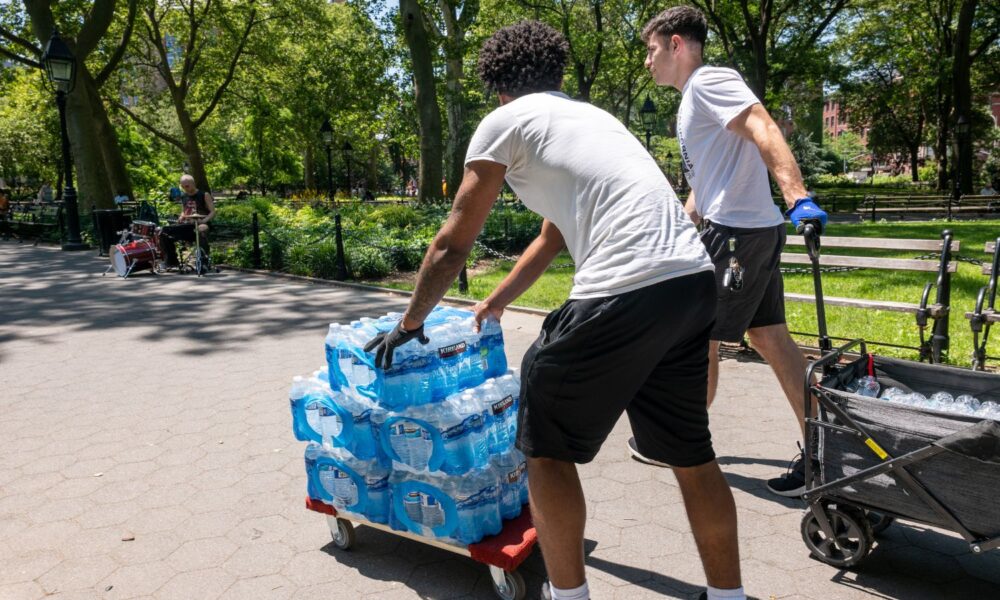This past June, three workers across the Southern US reportedly died from extreme heat: an outdoor worker in Atlanta, GA; Mitchell Huggins, a baseball umpire in Sumter County, SC; and Jacob Taylor, a US Postal Service employee in Dallas, TX. These deaths occurred the same month the federal Occupational Safety and Health Administration (OSHA) heard testimony from advocates in support of a proposed heat standard.
While heat is the leading cause of weather-related death, heat injury and mortality can be prevented if cautionary measures are taken. Currently, there is no federal mandate requiring employers to provide workers adequate water, rest, or shade—measures that could save lives from killer heat—despite such a proposal being supported by voters. As someone who has been tracking and advocating for heat protections for workers, my heart goes out to those who lost their lives, and to their loved ones.
And my outrage goes to those who advocate against heat protection mandates, or suggest that the Trump administration enact a weakened standard on behalf of greedy corporations.
Extreme heat can sneak up on people and cause injury or death, and that’s why it is crucial to have systems in place to keep people safe. The Department of Labor proposed a heat stress standard to acknowledge and correct for the lack of mandated heat protections under OSHA. In addition to supporting the heat standard, UCS is working in coalition to urge Congress to take meaningful action to protect workers’ lives and livelihoods by passing the much needed Asunción Valdivia Heat Illness, Injury and Fatality Prevention Act—legislation that requires employers to provide workers regular paid breaks in cool or shaded environments, access to water, emergency response protocols for employees suffering from heat, proper training for employers and workers on heat stress illness and prevention, and access to protective clothing.
An article from Inside Climate News says that “OSHA’s ability to protect workers has “greatly diminished” over the years, according to the latest Death on the Job report from the AFL-CIO, the largest federation of US unions.”
Local efforts to protect workers face “Death Star” opposition
In the absence of a national heat stress standard, we’ve been advocating for states, counties, and cities to pass worker heat protection measures that are backed by science and evidence and can ensure better enforcement at the local level. Some states have enacted statewide protections for workers. At the county level, the WeCount ¡Qué Calor! campaign, for example, is led by workers to advocate for enforceable heat protections. They were nearly successful in passing an ordinance in Miami-Dade County, until the Florida state legislature banned local bills protecting workers from extreme heat with House Bill 433. Despite a broad coalition of faith and worker organizations calling for FL Governor DeSantis to veto the bill, it was signed and enacted in 2024.
Florida was just following in the footsteps of Texas. The cities of Austin and Dallas had passed local bills to require employers to provide water breaks to construction workers. The Texas legislature responded with HB2127, nicknamed the “Death Star” bill, which prevented localities from enacting policies that differ from state regulations, thus killing the local ordinances. Following a fight between cities and the state in court, the bill is now in effect.
These cruel bills have earned the nickname of “Death Star” bills after the Galactic Empire’s (aka the bad guys) planet-killing weapon in the Star Wars universe. The Death Star’s purpose is to instill fear and to eliminate threats to the Empire’s power—much like these bills eliminate more rigorous regulations that would take power away from the state legislature and their industry cronies. And the result is, honestly, death.
David Michaels, previous head of OSHA, responded to the Texas bill, saying “[T]he better solution would be to have a national standard, but since we do not, local ordinances are very important for saving lives. Prohibiting these local laws will result in workers being severely hurt or killed.”
Heed the warning: stop state preemption bills
The LAST thing workers need is more states following the cruel example of the Florida and Texas legislatures; however, my home state of Kentucky just did. Days after a June heat dome produced dangerously hot weather in the eastern US, HB398 became law in Kentucky.
HB398 prohibits “the Kentucky Occupational Safety and Health Standards Board or the secretary of the Education Labor Cabinet from enforcing any occupational safety and health administrative regulation that has not been promulgated by or that is more stringent than the corresponding federal provision.” According to the KY Center for Economic Policy, “this ban adds to a 2021 law that prevents the state from issuing any new worker safety regulations… in a state where fatality and injury rates exceed the national average.” While not all deaths or injuries are heat-related in the report, it is a documented issue in KY: the Kentucky Occupational Safety and Health Surveillance Program found that 467 Kentucky workers visited the emergency department due to heat-related illnesses from 2019 to 2023. As summers get hotter, we can only expect this number to grow unless we act accordingly.
Instead, lawmakers are choosing to protect business interests over workers’ health and safety. Representative Walker Thomas of Hopkinsville spelled it out very clearly when introducing HB398. He says that when he took office, “[L]eadership decided to take bold measures to transform this Commonwealth to one of the most business-friendly climates in the country… This bill just shows our commitment to the business community while not jeopardizing the safety of our great employees that make everything work.”
He can claim that this doesn’t jeopardize worker safety, but that doesn’t mean it’s true. Kentucky legislators have voted to prevent themselves from enforcing policies for workers and working conditions that would go beyond already insufficient federal laws.
Governor Andy Beshear vetoed HB398 because it “would make Kentuckians less safe in the workplace and hand over much of the authority to regulate, investigate, and enforce Kentucky workplace safety and health standards to the federal government.” Moreover, he said it “will lead to more workplace injuries, with Kentucky workers paying the price.” All but two Kentucky Republican state lawmakers voted to override the governor’s veto and force HB398 into law, and the law went into effect on a dangerously hot June day.
In fact, the same day HB398 became law, UPS workers rallied in Kentucky for safer heat protections. Unions are fighting tooth and nail to get protection for their workers. Two years ago, I wrote about efforts by UPS workers, represented by the Teamsters, to get their employer to provide cooling equipment in vehicles. And while they were successful in their union contract negotiations, workers say that UPS is not complying with the contract and creating unsafe working conditions in the dangerous heat. Again, this is why we need a national heat standard: so that employers are all playing by the same rulebook that puts worker health and safety first.
Worker advocates must see the Kentucky bill as a warning and get ahead of similar preemption laws that may be drafted in other states. While the legislature was debating HB398, the National Council for Occupational Safety and Health advised: “If this were to happen, it would set a bad example for the entire country, and we hope that no state considers proposing such a policy. We cannot afford to let such policies take root in any state. The safety of workers in Kentucky is a matter of national importance.”
It happened. It’s a bad example. And now we must fight to ensure that other states don’t follow this horrible path and, instead, fight for the national standard as the better solution.
It’s getting hotter and federal protection is lacking
“According to UCS research, climate change is projected to quadruple US outdoor workers’ exposure to hazardous heat conditions between now and midcentury if policymakers fail to make strides in sharply reducing global warming emissions. And without a federal heat standard in place, the country’s 32 million outdoor workers will be faced with a cruel choice each Danger Season: their health or their jobs,” says my colleague Shana Udvardy.
I urge every elected official to use the UCS heat tool to see how dangerously hot their districts will be in the near future. For example, here’s the prediction for KY Rep. Thomas’ county:

For workers and the local economy in Christian County, according to the UCS Too Hot to Work report, if we fail to reduce heat-trapping emissions by midcentury, 22 workdays per year would be at risk due to extreme heat for outdoor workers. The loss of safe workdays would put $14,691,623 in outdoor workers’ earnings at risk annually across the county, representing 9% of total outdoor worker earnings. Sponsoring legislation that makes it harder to protect Kentucky workers from deadly heat that gets worse every year seems, at best, shortsighted… and at worst, cruel.
Tell Congress to pass the Asunción Valdivia bill
The Asunción Valdivia bill is named after a farmworker who tragically died while working in extreme heat and did not receive adequate medical attention from his employer. Congress can pass this legislation that establishes protections for workers now and sets a higher safety standard for workers at the federal level. You can help protect workers today by sending a personalized letter to your representatives in support of this legislation. Every day that Congress delays, they put workers’ lives at risk.
This bill is our shot to defeat “Death Star” bills. And we can do it—because (*spoiler alert*) Luke Skywalker and his team successfully blew up the Death Star weapon even though it was thought to be impenetrable. We can, metaphorically, do the same by using our people power to overcome the influence of lobbyists and business interests that put workers’ safety at risk. Let’s continue to stand united together against preemption bills and demand Congress finally put people first and pass the Asunción Valdivia Heat Illness, Injury and Fatality Prevention Act.
We’re in this fight together. This is the Way.

